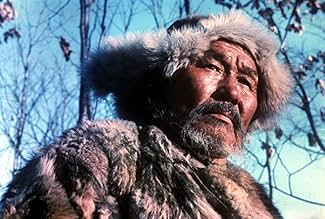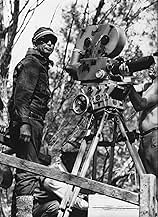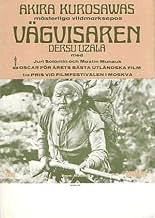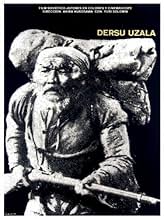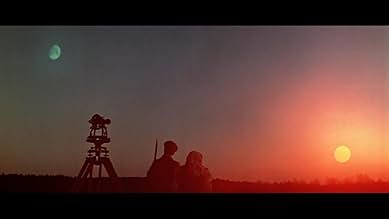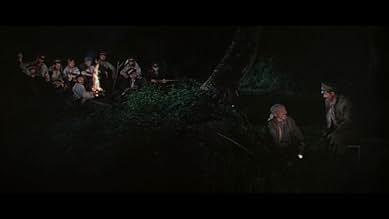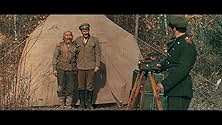IMDb रेटिंग
8.2/10
35 हज़ार
आपकी रेटिंग
अपनी भाषा में प्लॉट जोड़ेंThe Russian army sends an explorer on an expedition to the snowy Siberian wilderness where he makes friends with a seasoned local hunter.The Russian army sends an explorer on an expedition to the snowy Siberian wilderness where he makes friends with a seasoned local hunter.The Russian army sends an explorer on an expedition to the snowy Siberian wilderness where he makes friends with a seasoned local hunter.
- निर्देशक
- लेखक
- स्टार
- 1 ऑस्कर जीते
- 8 जीत और कुल 1 नामांकन
Mikhail Bychkov
- Otryad Arseneva
- (as M. Bychkov)
Vladimir Khrulyov
- Otryad Arseneva
- (as V. Khrulyov)
Stanislav Marin
- Otryad Arseneva
- (as S. Marin)
Igor Sykhra
- Otryad Arseneva
- (as I. Sykhra)
Vladimir Sergiyakov
- Otryad Arseneva
- (as V. Sergiyakov)
Yanis Yakobsons
- Otryad Arseneva
- (as Ya. Yakobsons)
Vladimir Khlestov
- Otryad Arseneva
- (as V. Khlestov)
Vladimir Sverba
- Otryad Arseneva
- (as V. Sverba)
Vladimir Kremena
- Turtygin
- (as V. Kremena)
Aleksandr Pyatkov
- Olenev
- (as A. Pyatkov)
फ़ीचर्ड समीक्षाएं
On the face of it, Dersu Uzala would not seem like a candidate for a great film. The story is about a young Russian (Imperial Russia) officer is sent to the far east of Siberia to explore. He meets with a native of the region and they form a bond together. The territory in question is the wild, rugged eastern Siberia (north of Valdivostok). I would say that you have not lived until you have seen what Kurosawa can do filming nature in its raw splendor and magnificence. The scenes in this film like the wind rushing through the tall reeds, or the mist draping the forested hills, are images of haunting beauty.
Kurosawa, one of the greatest film directors of the 20th century, made his final masterpiece with film. The characters are well drawn, the sub-text of the story (the clash of civilization vs. nature) is nuanced, but most of all it is the wild beauty of nature which is the focus of this film. Once you see it, I don't think you will forget it, I know I never have.
Kurosawa, one of the greatest film directors of the 20th century, made his final masterpiece with film. The characters are well drawn, the sub-text of the story (the clash of civilization vs. nature) is nuanced, but most of all it is the wild beauty of nature which is the focus of this film. Once you see it, I don't think you will forget it, I know I never have.
I own many of Akira Kurosawa's films. I have Ran, Throne of blood, Seven Samarai, Roshomon, Dreams, Hidden Fortress, Jojimbo, Snajuro, Red Beard, and even "Kurosawa" the documentary. I guess you can say that I like his work. The "Kurosawa" documentary narrated by Sam Shepard and produced by thirteen / WNET I recommend for anyone at all interested in Kurosawa's films as it will really wet your appetite.
Of all of his films, Dersu Uzala is my favorite. It is also one of my favorite films by anybody. It was done shortly after Akira had went through a very dark time in his life and had attempted suicide. It was his first film afterwards and the content of the film appears to reflect more than a little of his mindset at the time. Dersu Uazla is both a feel good film and also a sad film. It touches the way that people as they grow older have a more and more difficult time adapting to life as it changes and has its affect on them. The end of the film can certainly show light on the inhumanity that appears to be growing more prevalent in our society. But, I think what you remember from the film is the love between two individuals, and that is what feels good.
Many of Kurosawa's films have a great deal of spectacle, and he is perhaps known best for his Samarai films. There is none of that in this movie. Dersu Uzala is a statement by Akira of life. Akira was fighting to keep making films and was not having an easy time of it. If Akira Kurosawa could not make films, he could not feel that he was living. As a result, he attempted suicide. He survived to make this film plus many others that we all enjoy today. Dersu Uzala may be the most important of his films and the one that shows the great director's true personality. Just perhaps, it shows more about humanity than any of his other films. Again, it is my favorite.
Of all of his films, Dersu Uzala is my favorite. It is also one of my favorite films by anybody. It was done shortly after Akira had went through a very dark time in his life and had attempted suicide. It was his first film afterwards and the content of the film appears to reflect more than a little of his mindset at the time. Dersu Uazla is both a feel good film and also a sad film. It touches the way that people as they grow older have a more and more difficult time adapting to life as it changes and has its affect on them. The end of the film can certainly show light on the inhumanity that appears to be growing more prevalent in our society. But, I think what you remember from the film is the love between two individuals, and that is what feels good.
Many of Kurosawa's films have a great deal of spectacle, and he is perhaps known best for his Samarai films. There is none of that in this movie. Dersu Uzala is a statement by Akira of life. Akira was fighting to keep making films and was not having an easy time of it. If Akira Kurosawa could not make films, he could not feel that he was living. As a result, he attempted suicide. He survived to make this film plus many others that we all enjoy today. Dersu Uzala may be the most important of his films and the one that shows the great director's true personality. Just perhaps, it shows more about humanity than any of his other films. Again, it is my favorite.
9vdg
..and his name was Akira Kurosawa. Once upon a time there was a simple man: a hunter, and simple story of friendship and reflection about life. Once upon a time a magnificent director and film crew have put a beautiful story on the screen with such perfection, that in our days we look back and we wonder: why movies like this are not being made anymore??
It doesn't matter if you like any other Kurosawa's works or any other 'Russian' films, because this one would touch you so much that you would go back and looked for similar films I wish I could see this film in all his beauty: on a big screen, in the original format (70 mm), as I felt that I missed a lot of details from the TV format.
There are directors and there is Kurosawa, there are dramas and there are Russian stories, so when you put both of them together, what do you get? Dersu Uzala!
Enjoy it, at least as much I did
It doesn't matter if you like any other Kurosawa's works or any other 'Russian' films, because this one would touch you so much that you would go back and looked for similar films I wish I could see this film in all his beauty: on a big screen, in the original format (70 mm), as I felt that I missed a lot of details from the TV format.
There are directors and there is Kurosawa, there are dramas and there are Russian stories, so when you put both of them together, what do you get? Dersu Uzala!
Enjoy it, at least as much I did
Akira Kurosawa was a masterful director and powerful storyteller, Dersu has always been my favourite of his films. It was also the first I saw - on Christmas Day afternoon 1978 on UK BBC2 - would that they were as adventurous nowadays! Since then of course I've seen all of his films from Stray Dog on, Rashomon and Ran being especial favourites, but I keep on coming back to watch this one, ostensibly the simplest tale Kurosawa ever filmed.
The understanding and bonding that develops between the two men Arseniev and Dersu is wonderful to see, and over two hours holds your attention with expertly observed minutiae of character and scenic interplay. The last ten minutes cover a lot of ground (no pun intended) but it's all so logical and sad that I always need to see the end credits to recover.
So many marvellous scenes: the tiger in the forest in the morning; the phlegmatic reclusive old Chinaman; the raft; wispy blue shaded smoke from night-fires; the conclusion of course; the view of those two great men, the Moon and the Sun in the same shot. Not everyone would like Dersu, their most likely comments being "boring" - but how wrong they are they'll never know!
A film not fit to lick Dersu Uzala's metaphorical boots (or even Plan 9 from Outer Space's for that matter), Blazing Saddles was filmed the same year in America and a generation on still gets more praise than this poetic masterpiece!
The understanding and bonding that develops between the two men Arseniev and Dersu is wonderful to see, and over two hours holds your attention with expertly observed minutiae of character and scenic interplay. The last ten minutes cover a lot of ground (no pun intended) but it's all so logical and sad that I always need to see the end credits to recover.
So many marvellous scenes: the tiger in the forest in the morning; the phlegmatic reclusive old Chinaman; the raft; wispy blue shaded smoke from night-fires; the conclusion of course; the view of those two great men, the Moon and the Sun in the same shot. Not everyone would like Dersu, their most likely comments being "boring" - but how wrong they are they'll never know!
A film not fit to lick Dersu Uzala's metaphorical boots (or even Plan 9 from Outer Space's for that matter), Blazing Saddles was filmed the same year in America and a generation on still gets more praise than this poetic masterpiece!
10hartj-1
A wonderful film. It showcases the natural beauty of the Taiga and presents a contrast between the technological and the pastoral. Dersu is one with the forest. He knows its ways and its moods. The Russians scoff at his ways and his 'primitive' belief system, but eventually come to rely on him, and even love him. It is a beautiful story that takes place in an world that very few of us in the West have had a chance to see. I thought the fact that the film was set in the pre-revolutionary period gave it a peculiar sort of charm - Russia before the Great War and the Russian Revolution was innocent and even naive, the same way the Russian soldiers were innocent of the wonders and the dangers of the Taiga. One of the things I loved most about this film was the cinematography - there are long, lingering shots of the landscape, the endless steppe, the forest, the rivers, the mountains. We believe ourselves to be powerful because we have been moderately successful in our attempts to harness nature for our own uses, but the film shows us that we are deluding ourselves, that nature cannot be controlled or resisted, and the truly powerful are those, like Dersu, who co-exist in harmony with nature and learn what the wilderness teaches.
क्या आपको पता है
- ट्रिवियाAkira Kurosawa had hoped to make this film as early as in the 1950s, but he had trouble adapting the story to a Japanese setting, never thinking that one day he would actually be able to film it on location in Russia, and with Russian actors.
- गूफ़When Dersu and Arsenev are looking at the 3/4 moon and the setting sun, the moon is in the wrong phase to appear in the sky at the same time as the sun.
- भाव
Dersu Uzala: How can people live in a box?
- कनेक्शनFeatured in For the Love of Movies: The Story of American Film Criticism (2009)
टॉप पसंद
रेटिंग देने के लिए साइन-इन करें और वैयक्तिकृत सुझावों के लिए वॉचलिस्ट करें
- How long is Dersu Uzala?Alexa द्वारा संचालित
विवरण
बॉक्स ऑफ़िस
- बजट
- $40,00,000(अनुमानित)
- दुनिया भर में सकल
- $14,480
- चलने की अवधि2 घंटे 22 मिनट
- रंग
- पक्ष अनुपात
- 2.20 : 1
इस पेज में योगदान दें
किसी बदलाव का सुझाव दें या अनुपलब्ध कॉन्टेंट जोड़ें


